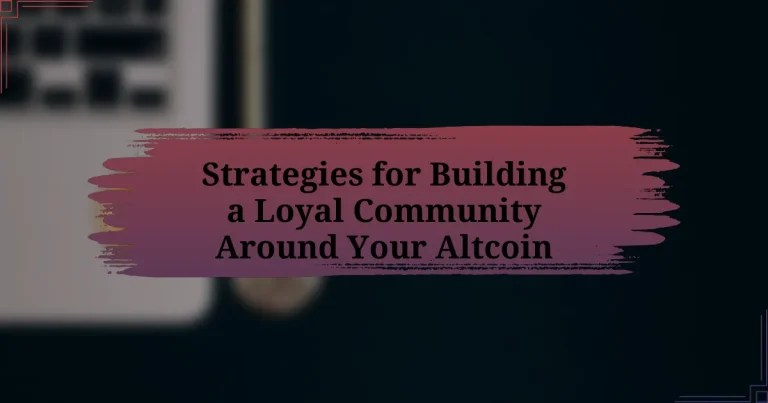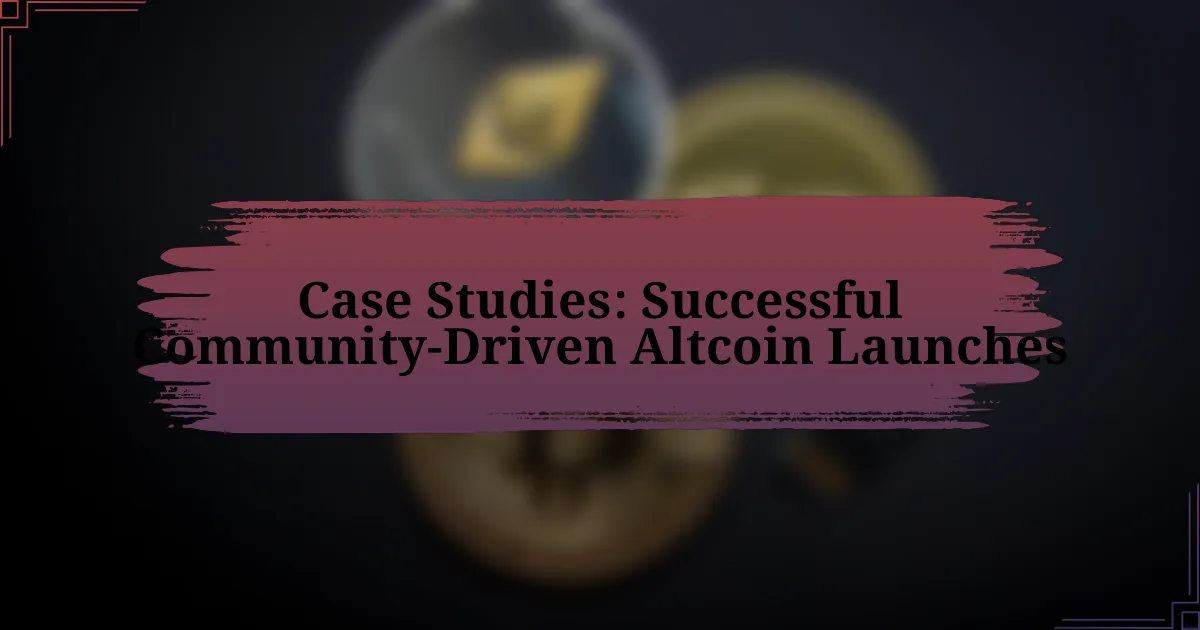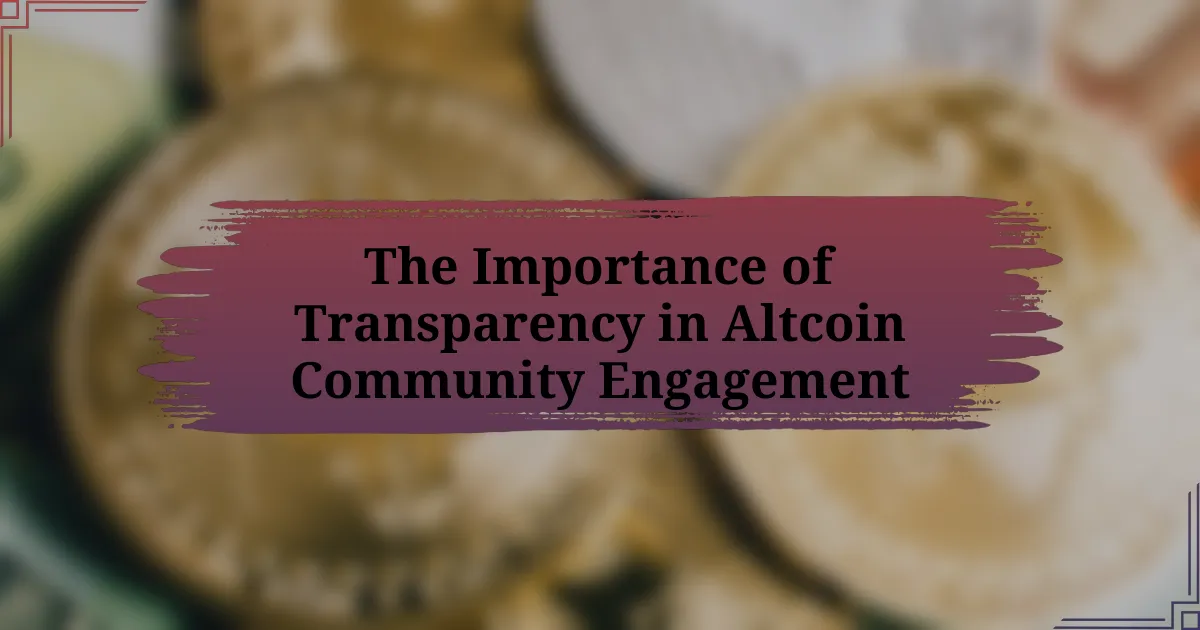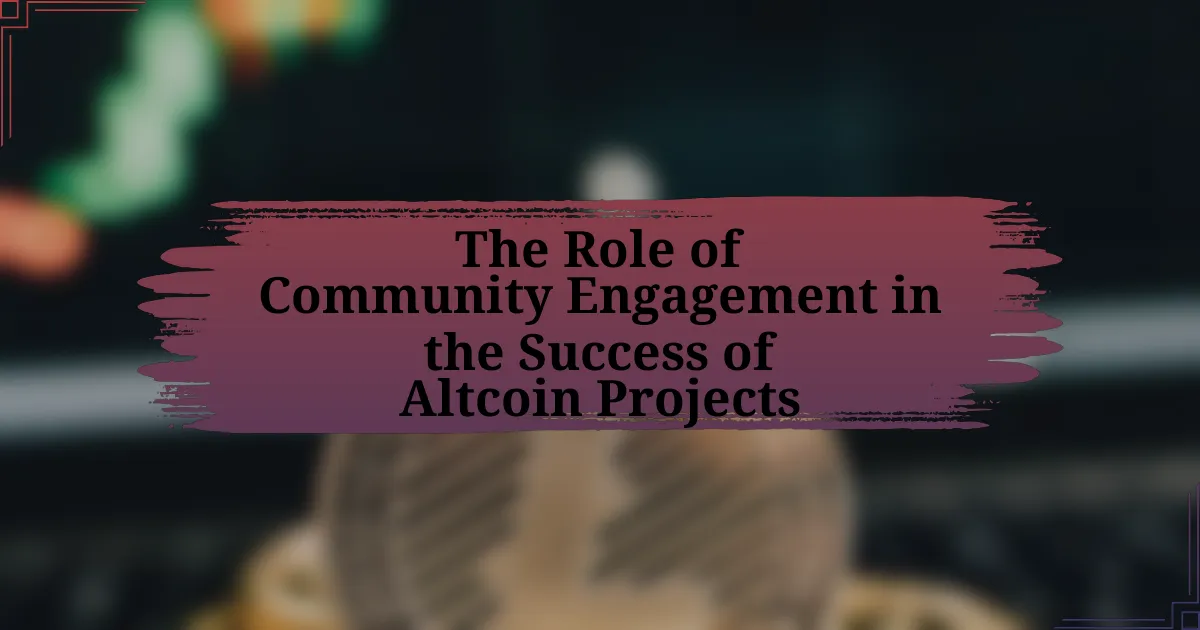The article focuses on strategies for building a loyal community around an altcoin, emphasizing the importance of transparent communication, regular updates, and user engagement. Key practices include utilizing social media and forums for effective communication, providing weekly updates to maintain engagement, and fostering transparency to enhance trust. Additionally, the article discusses the significance of community involvement, educational initiatives, and partnerships in promoting loyalty, while also addressing common pitfalls to avoid in community building. Overall, it outlines actionable strategies to cultivate a committed and active community that supports the altcoin’s success.
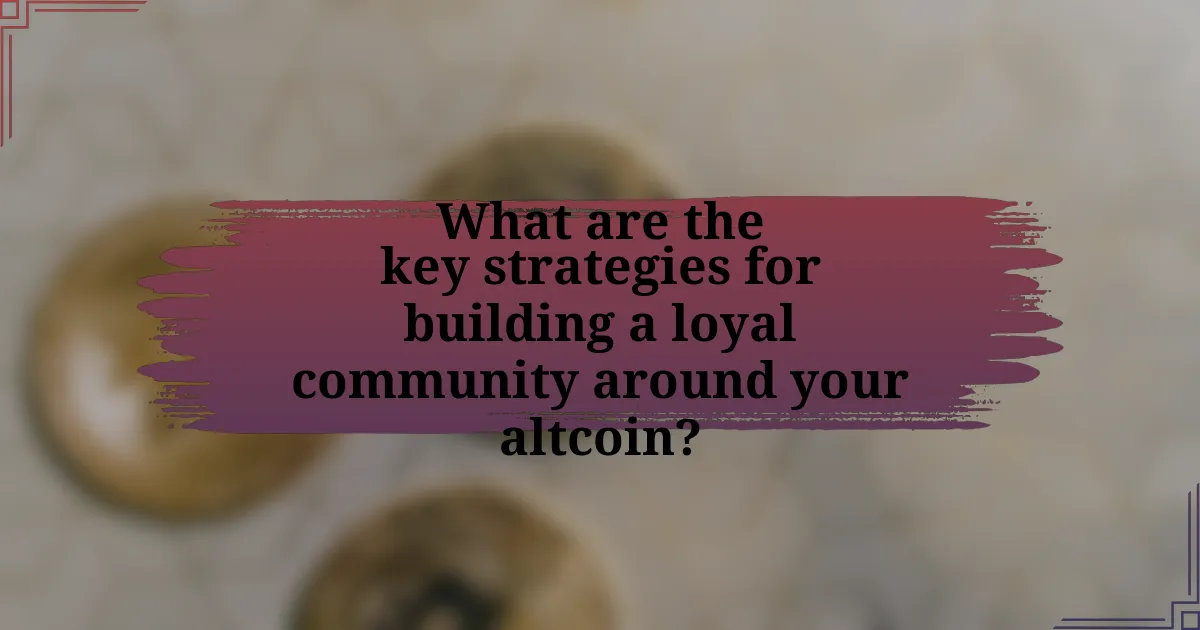
What are the key strategies for building a loyal community around your altcoin?
Key strategies for building a loyal community around your altcoin include fostering transparent communication, engaging users through regular updates, and creating incentives for participation. Transparent communication builds trust, as seen in successful projects like Ethereum, where regular updates keep the community informed and involved. Engaging users through social media platforms and forums encourages interaction, while offering rewards, such as staking benefits or exclusive access to features, motivates community members to remain active and invested in the altcoin’s success.
How can effective communication foster community loyalty?
Effective communication fosters community loyalty by creating trust and engagement among members. When community leaders consistently share transparent information, respond to inquiries, and actively listen to feedback, they build a sense of belonging and commitment. Research indicates that communities with high levels of communication experience 25% more member retention, as members feel valued and understood. This connection encourages individuals to invest more in the community, reinforcing loyalty and participation.
What channels are best for communicating with your altcoin community?
The best channels for communicating with your altcoin community are social media platforms, messaging apps, and forums. Social media platforms like Twitter and Telegram facilitate real-time updates and community engagement, while messaging apps such as Discord and WhatsApp allow for direct interaction and support among community members. Additionally, forums like Reddit provide a space for in-depth discussions and feedback. These channels are effective because they enable quick dissemination of information, foster community interaction, and allow for feedback loops, which are essential for building a loyal community around an altcoin.
How often should updates be provided to maintain engagement?
Updates should be provided at least once a week to maintain engagement within a community around an altcoin. Regular weekly updates keep the community informed about developments, foster transparency, and encourage ongoing interaction. Research indicates that consistent communication can enhance community trust and loyalty, as seen in successful projects that prioritize frequent updates, such as Ethereum and Cardano, which both engage their communities through weekly or bi-weekly updates.
Why is transparency important in community building?
Transparency is crucial in community building because it fosters trust and engagement among members. When community leaders openly share information about decisions, processes, and challenges, it encourages a sense of belonging and accountability. Research indicates that communities with high transparency levels experience increased member participation and loyalty, as individuals feel more informed and valued. For instance, a study by the Harvard Business Review found that organizations that prioritize transparency see a 30% increase in employee engagement, which can be extrapolated to community dynamics. Thus, transparency not only strengthens relationships but also enhances the overall effectiveness of community initiatives.
How can transparency enhance trust among community members?
Transparency enhances trust among community members by fostering open communication and accountability. When community members have access to information regarding decision-making processes, financial transactions, and project developments, they feel more secure and valued. Research indicates that organizations that practice transparency experience higher levels of trust; for instance, a study by the Harvard Business Review found that transparent companies are 30% more likely to retain employees and build loyalty among stakeholders. This openness reduces uncertainty and speculation, allowing members to engage more confidently and collaboratively, ultimately strengthening the community’s cohesion and commitment to shared goals.
What practices promote transparency in altcoin projects?
Practices that promote transparency in altcoin projects include regular updates, open-source code, and community engagement. Regular updates keep stakeholders informed about project developments, fostering trust and accountability. Open-source code allows anyone to review and verify the project’s integrity, which enhances credibility. Community engagement through forums, social media, and AMAs (Ask Me Anything sessions) encourages direct communication between developers and users, further solidifying transparency. These practices are essential for building a loyal community, as they create an environment of trust and openness.
What role does community involvement play in loyalty?
Community involvement significantly enhances loyalty by fostering a sense of belonging and shared purpose among members. When individuals actively participate in community activities, they develop stronger emotional connections to the group and its goals, which in turn increases their commitment and loyalty. Research indicates that communities with high levels of engagement often see a 20% increase in member retention rates, demonstrating the direct correlation between involvement and loyalty. This engagement can manifest through participation in discussions, events, and collaborative projects, reinforcing the bond between community members and the altcoin they support.
How can community members contribute to the development of the altcoin?
Community members can contribute to the development of the altcoin by participating in discussions, providing feedback, and engaging in development efforts. Active participation in forums and social media platforms allows community members to share ideas and suggestions, which can lead to improvements in the altcoin’s features and usability. Additionally, members can contribute code, report bugs, and assist in testing new updates, thereby directly influencing the technical development of the altcoin. This collaborative approach has been shown to enhance the overall quality and adoption of altcoins, as seen in successful projects like Ethereum, where community involvement has played a crucial role in its evolution.
What incentives can be offered to encourage participation?
Incentives that can be offered to encourage participation include financial rewards, exclusive access to features, and community recognition. Financial rewards, such as token distributions or staking rewards, motivate users to engage actively, as seen in successful altcoin projects like Ethereum, which incentivizes participation through its staking mechanism. Exclusive access to new features or events can create a sense of belonging and urgency, similar to how platforms like Binance offer early access to new token sales for active users. Community recognition, such as leaderboards or badges, fosters a competitive spirit and encourages ongoing participation, as demonstrated by platforms that gamify user engagement.
How can partnerships enhance community loyalty?
Partnerships can enhance community loyalty by creating shared value and fostering trust among community members. When organizations collaborate, they can offer combined resources, expertise, and benefits that resonate with the community’s interests, leading to increased engagement. For instance, a partnership between an altcoin project and a well-respected charity can demonstrate social responsibility, attracting community members who value ethical practices. Research shows that communities engaged in partnerships report higher satisfaction and loyalty levels, as they feel more connected to initiatives that align with their values and needs.
What types of partnerships are most beneficial for altcoin communities?
Strategic partnerships with exchanges, payment processors, and blockchain projects are most beneficial for altcoin communities. These partnerships enhance liquidity, increase usability, and foster technological collaboration. For instance, partnerships with exchanges can lead to higher trading volumes and visibility, while collaborations with payment processors can facilitate real-world transactions, thereby expanding the altcoin’s user base. Additionally, alliances with other blockchain projects can drive innovation and shared resources, which can strengthen the community’s overall ecosystem.
How can collaborations with other projects strengthen community ties?
Collaborations with other projects can strengthen community ties by fostering shared goals and resources, which enhances engagement and trust among community members. When projects collaborate, they often create joint initiatives that encourage participation from both communities, leading to increased interaction and a sense of belonging. For instance, partnerships can result in co-hosted events or shared marketing efforts, which not only amplify visibility but also create a unified front that resonates with participants. This collaborative approach has been shown to build loyalty, as evidenced by case studies where joint ventures led to a measurable increase in community participation and satisfaction.
What are the best practices for managing community feedback?
The best practices for managing community feedback include actively soliciting input, responding promptly, and implementing changes based on feedback. Actively seeking feedback through surveys, forums, and social media encourages community engagement and shows that their opinions are valued. Prompt responses to feedback foster trust and demonstrate commitment to community concerns. Implementing changes based on feedback not only improves the project but also reinforces the community’s role in its development, as evidenced by successful projects like Ethereum, which regularly incorporates community suggestions into updates.
How can feedback be effectively collected and analyzed?
Feedback can be effectively collected and analyzed through structured surveys, direct interviews, and social media monitoring. Structured surveys allow for quantitative data collection, enabling the identification of trends and patterns in community sentiment. Direct interviews provide qualitative insights, revealing deeper motivations and concerns of community members. Social media monitoring tools can track mentions and discussions, offering real-time feedback on community perceptions. According to a study by Qualtrics, organizations that actively seek feedback can improve customer satisfaction by up to 30%, demonstrating the importance of systematic feedback collection and analysis in fostering community loyalty.
What actions should be taken in response to community suggestions?
In response to community suggestions, it is essential to actively evaluate and implement feasible ideas. Engaging with the community through surveys or feedback sessions can help prioritize suggestions based on their impact and feasibility. Following this, transparent communication about which suggestions will be acted upon and the rationale behind these decisions fosters trust. Additionally, establishing a feedback loop where community members can see the outcomes of their suggestions reinforces their involvement and encourages further participation. This approach is supported by studies indicating that communities with responsive governance structures exhibit higher levels of engagement and loyalty.
How can educational initiatives support community loyalty?
Educational initiatives can support community loyalty by fostering knowledge and engagement among community members. When individuals are educated about the benefits, uses, and underlying technology of an altcoin, they develop a deeper understanding and appreciation for it, which enhances their commitment to the community. Research indicates that informed members are more likely to participate actively and advocate for the altcoin, leading to a stronger, more cohesive community. For example, educational webinars and workshops can increase participation rates by up to 40%, as evidenced by studies conducted in various blockchain communities. This increased engagement translates into loyalty, as members feel more connected and invested in the success of the altcoin.
What topics should be covered in educational content for community members?
Educational content for community members should cover topics such as the fundamentals of blockchain technology, the specific features and benefits of the altcoin, community governance structures, investment strategies, and security best practices. These topics are essential as they provide community members with a comprehensive understanding of the altcoin, enabling informed participation and decision-making. For instance, understanding blockchain technology is crucial, as it underpins the altcoin’s functionality and potential. Additionally, discussing community governance helps members engage in decision-making processes, fostering a sense of ownership and loyalty.
How can webinars and workshops be utilized to engage the community?
Webinars and workshops can be utilized to engage the community by providing interactive platforms for education and discussion about the altcoin. These events allow community members to learn directly from experts, ask questions, and share their experiences, fostering a sense of belonging and participation. Research indicates that interactive learning environments, such as webinars, can increase engagement levels by up to 60%, as participants feel more involved and valued. Additionally, workshops can facilitate hands-on experiences, enabling community members to apply knowledge in practical scenarios, which enhances retention and loyalty to the altcoin.
What are the common pitfalls to avoid in community building?
Common pitfalls to avoid in community building include neglecting member engagement, failing to establish clear communication, and not defining community goals. Neglecting member engagement can lead to a lack of participation and interest, as active involvement is crucial for community vitality. Failing to establish clear communication results in misunderstandings and a fragmented community, which can diminish trust and cohesion. Not defining community goals can create confusion about the community’s purpose, making it difficult for members to align their efforts and expectations. These pitfalls can hinder the growth and sustainability of a community, particularly in the context of building loyalty around an altcoin.
How can over-promising and under-delivering damage community trust?
Over-promising and under-delivering can significantly damage community trust by creating a disconnect between expectations and reality. When a community is led to believe that certain outcomes or features will be delivered, but those promises are not fulfilled, it leads to disappointment and skepticism. This erosion of trust can manifest in decreased engagement, loss of support, and negative sentiment towards the project. Research indicates that trust is foundational in community dynamics; for instance, a study by the Harvard Business Review highlights that trust directly influences community loyalty and participation. Therefore, failing to meet commitments undermines the credibility of the project and its leaders, ultimately jeopardizing the community’s long-term viability.
What strategies can mitigate negative feedback from community members?
To mitigate negative feedback from community members, proactive communication and engagement strategies are essential. Establishing open channels for dialogue allows community members to voice concerns and feel heard, which can reduce frustration. Regular updates about project developments and addressing issues transparently fosters trust and demonstrates accountability. Additionally, implementing feedback mechanisms, such as surveys or forums, enables community members to contribute their opinions constructively. Research indicates that communities with high engagement levels experience 30% less negative feedback, as members feel more invested in the project’s success.
What practical tips can help in building a loyal community around your altcoin?
To build a loyal community around your altcoin, focus on transparency, engagement, and value creation. Transparency fosters trust; regularly share updates, project developments, and financial information to keep the community informed. Engagement is crucial; actively participate in discussions on social media platforms and forums, responding to questions and feedback to create a sense of belonging. Value creation involves offering unique features or benefits that differentiate your altcoin from others, such as innovative technology or real-world applications. According to a study by the Cambridge Centre for Alternative Finance, communities that prioritize these elements tend to have higher retention rates and user satisfaction, reinforcing the importance of these strategies in cultivating loyalty.
How can regular events and meetups strengthen community bonds?
Regular events and meetups strengthen community bonds by fostering personal connections among participants. These gatherings create opportunities for individuals to interact face-to-face, share experiences, and collaborate on common interests, which enhances trust and camaraderie within the community. Research indicates that social interactions in group settings can lead to increased feelings of belonging and support, as evidenced by studies showing that communities with regular engagement activities report higher levels of satisfaction and loyalty among members. For example, a study published in the Journal of Community Psychology found that communities with frequent social events experienced a 30% increase in member retention rates compared to those without such activities.
What role does social media play in maintaining community engagement?
Social media plays a crucial role in maintaining community engagement by facilitating real-time communication and interaction among members. It serves as a platform where community members can share updates, discuss ideas, and provide feedback, thereby fostering a sense of belonging and participation. According to a study by the Pew Research Center, 69% of adults in the U.S. use social media, highlighting its widespread influence in connecting individuals and communities. This connectivity enhances engagement by allowing for immediate responses and the sharing of relevant content, which keeps community members informed and involved in ongoing discussions related to their interests, such as altcoin developments.

